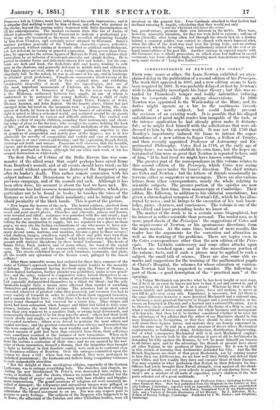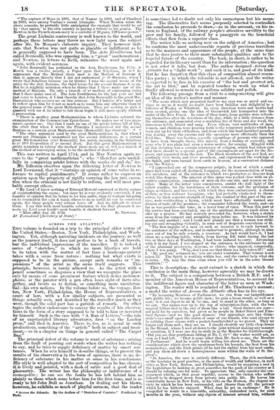CORRESPONDENCE OF NEWTON AND COTES. * Filont some cause or other,
Sir Isaac Newton exhibited an unex- plained delay in the publication of a second edition of his P rincipia. The work first appeared in 1687, and a new edition seems to have been required by 1691. It was probably delayed at first by Newton's wish to thoroughly investigate his lunar theory ; but this was re- tarded by Flamsteed's temper and bodily infirmities inducing him to cooperate coldly in making observations. In 1696 Newton was appointed to the Wardenship of the Mint ; and its duties might operate as a bar to the continuous investi- gation of a new subject, but could hardly prevent the revision of an existing work. It is possible that his alleged enfeeblement of mind might render him incapable of the task, or the intense application he had already given make it distaste- ful; or he might feed himself with the solicitations that were ad- dressed to him by the scientific world. It was not till 1709 that Bentley's importunity induced Sir Isaac to intrust the super- intendence of a new edition to Roger Cotes, a Fellow of Trinity, and then recently appointed Professor of Astronomy and Ex- perimental Philosophy. Cotes died in 1716, at the early age of thirty-four ; too soon to establish his own fame, but the hopes en- tertained of him were so great that Newton is reported to have said of him, "If he had lived we might have known something."
The greater part of the correspondence in this volume relates to this second edition of the Principle which Cotes was seeing through the press under Sir Isaac's direction. The chief writers are Cotes and Newton ; but the letters of friends occasionally in- tervene either as suggesters or messengers. There are also various letters from other correspondents, nearly the whole relating to scientific subjects. The greater portion of the epistles are now printed for the first time' from manuscripts at Cambridge. Their editor, Mr. Edleston, in addition to his editorial annotations has given a chronological synopsis of Newton's life, which he has illus- trated by notes ; and he brings to the execution of his task know- ledge, pains, clearness, and conciseness. The volume is one of the best edited and least pretending books we know of. The matter of the work is in a certain sense biographical, but its interest is rather scientific than personal. The reader sees, as it were, proof-sheets of the Principle : the suggestions of Cotes and the acquiescence of Newton, or his spontaneous directions, form the main matter. At the same time, instead of mere results, the reader has the arguments for the correction and alteration as well as the working of the problems. There are topics even in the Cotes correspondence other than the new edition of the Prin- cipia. The Liebnitz controversy and some other attacks upon Newton are touched upon ; and in the miscellaneous portion of the volume, facts, and if such a phrase may be applied to such a subject, the small talk of science. There are also some able re- marks and suggestions for the training of the mathematical pupils at Christ's Hospital, the schemes for whose education or curricu- lum Newton had been requested to consider. The following is part of them—a good description of the "practical man" at the opening. 'A Vulgar Mechanick can practice what he has been taught or seen done, but if he is in an error he knows not how to find it out and correct it, and if you put him out of his road he is at a stand ; Whereas he that is able to reason nimbly and judiciously, about figure, force and motion, is never at rest till he gets over every rub. Experience is necessary, but yet there is the same difference between a mere practical Mechanick and a rational one, as between a mere practical Surveyor or Guag,er and a good Geometer, or be- tween an Empirick in Physick and a learned and a rational Physitian. Let it be therefore onely considered how itlechanical the frame of a Ship is, and on what a multitude of forces and motions the whole business and managment of it depends, And then let it be further considered whether it be most for the advantage of Sea affaires that the ablest of our Marriners should be but mere Empiricks in Navigation, or that they should be alsoe able to reason well about those figures, forces, and motions they are hourly concerned M. And the same may be said in a great measure of divers others Mechanical employments, as buildings of ships, Architecture, fortification, Engineering. ffor of what consequence Mechanical skill is in such Mechanical employ- ments may be known both by the advantage it gave of old to Archimedes in defending his City against the Romans, by wch he made himself see famous to all future ages, and by the advantage the french at present have above all other Nations in the goodness of their Engineers, for it was by skill in this Article of learning that Archimedes defended his City. And tho the french Engineers are short of that great Mechanick, yet by coming nearer to him then our Artificers doe we see how well they fortify and defend their ownc Cities, and how readily they force and conquer those of their Enemies. You may consider to what perfection that Nation by their Schooles for Sea- Officers had lately brought their Nevelt strength, even against all the disad- vantages of nature, and yet your schoole is capable of out-dosing them, for their's are a mixture of all sorts of capacities, your's children of the best parts selected out of a great multitude.
• Correspondence of Sir Isaac Newton and Professor Cotes; including Letters of other Eminent Men. Now first published from the Originals in the Library of Tri- nity College, Cambridge; together with an Appendix, containing other unpublished Letters and Papers by Newton ; with Notes, Synoptical View of the Philosopher s Life, and a Variety of Details illustrative of his History. By J. Edleston,. MA., Fellow of Trinity College, Cambridge. Published by J. W. Parker; and Deighton,
Cambridge.
"The capture of Mons in 1691, that of Namur in 1692, and of Charleroi im 1693, were among Vanban's recent triumphs. When Newton- wrote the above remarks; he probably little anticipated the example that would be set by that nation' to his own country in paying ,a tribute to his eenius. The Newton in the French steam-navy is a corvette of 26 guns, 220 horse-power.
The great Liebnita controversy is well known to the world, and perhaps. these letters may throw no new light upon the subject after Mr. Be Morg,an's elaborate inquiry. They however indi- cate that Newton was not quite so placable or indifferent as he is generally, supposed to have been. The Acta Eruditoruns had called Bernoulli, who was opposing him, a " great " mathematican ; and Newton, in letters to Keill, reiterates the word again and again, with evident soreness.
"John Bernouilli has published in the Ada Eruditorum for Fehr. & March was a twelve mouth, a Paper upon that Scholium, in weh he represents that the Method there used is the Method of fluxions & that it appears thereby that I did, not understand ye 2,1 ffinxions, when I wrote that Scholium because (as he thinks) I take the second terms of the series for the first flexions, the third terms for the second flexions & so on. But he is mightily mistaken when he thinks that I there make use of the method of fluxion& Tis miry a branch of ye method of converging series that I there make uses of. i'he Acts Eruditerum for the last year are but jett, come to London, & I find thereby that John Bernoullli is the great Ma- thematician who accuses me on this account. But I beleive it's better not ta reflect upon him for it nor so much as to name him any otherwise than by the general name of the great Mathematician. They are seeking to pick a quarrell with me & its better to lett them begin it still more openly without al provocation. "There is another great Mathematician- to whom Liebnitz referred the examination of the Commercium Epistolicum. He makes use of two argu- ments against me. One that I made no use of the priekt letters till of late, the other that when I wrote the Principle I understood not the second ffuaions-as a certain great Mathematician (Bernouilli) has observed." * * "The other argument used by the great Mathematician is, that when I wrote my Principm- I understood net the second diffiTences, as a certain great Mathematician (vies Bernouilli) has noted, meaning in the Scholium to ye 10th Proposition of ye second Book. But this great Mathematician is grosly mistaken in taking the method there made use of, weh is a branch of the method of converging series; to be the method of ile.eions."
This was written in April 1714, and in May Newton again re- curs to the "great mathematician"; who "therefore acts unskil- fully in compelling priekt letters with the marks dx and dy," &e.
Mr. Edleston observes upon the following letter of Newton to lord Townsend, that it "contains an opinion of some value in re- ference to capital punishments." It seems rather to express an opinion upon the propriety- of rigidly carrying the law into execu- tion when the criminal is not likely to reform, and will most pro- bably corrupt others: "-My Lord—I know nothing-of EdmtmdMetealf convicted at Derby assizes of. counteribiting the coyne ; but since he is very evidently convicted, I am humbly of opinion that its better to let him suffer, than to venture his going on to counterfeit the coin & teach others to do so untill he can be convicted again, ffor these people very seldom leave off. And its difficult to detect them. I say this with most humble submission to his Majs pleasure & re- main my Lord your Lorde's most humble & obedient Servant "Mint office Aug. 25: 172t. IS. NEWTON. 114- Townsbend [Secretary of State]."































 Previous page
Previous page